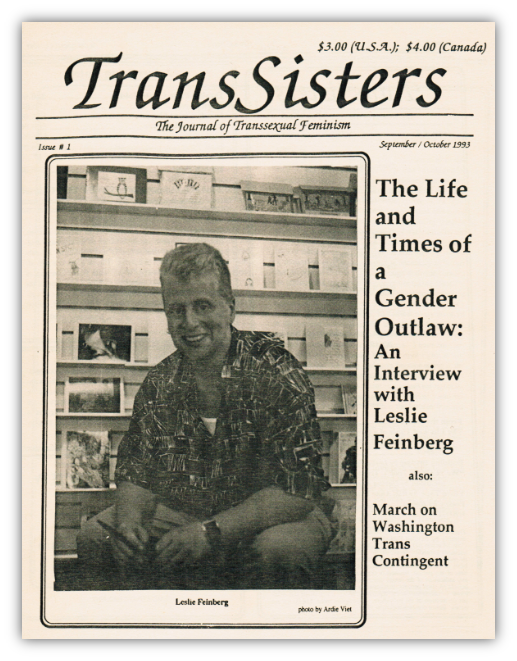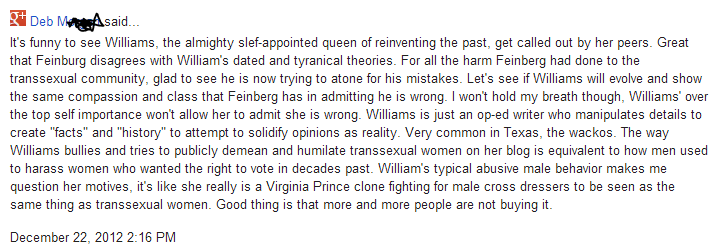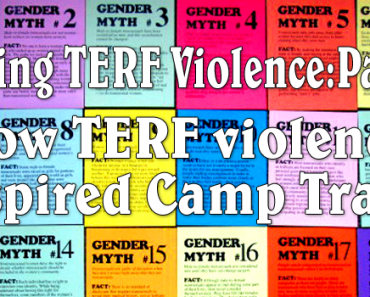Twenty years ago, a now defunct trans newsletter captured a really interesting moment in trans history: a linguistic tipping point. As I’ve noted:
- “Transgender” has been around since at least 1965
- “Transgender” was not “coined” by Virginia Prince
- Transsexuals have been using the term “transgender” since the 1970s
- “Transgender” was used in a modern sense as early as the 1970s
Trans Terminology Timeline Here
Even so, it was between the years 1985 and 1995 that the term became ubiquitous. What follows is an excerpt from an in-depth 1993 article that talks about the spread of this term “transgender.” This is the earliest mention of the phrase “umbrella term” relating to “transgender” that I’ve yet seen. Also, it’s worth noting that Leslie states that the usage is coming from the trans community itself. Lastly, I find Leslie’s prediction what will become of “transgender” fascinating in that it’s completely on target:
Davina: You were born a woman, and you identify as a woman, but you also identify as transgendered, which indicates to me that you have a broader definition of transgendered than do most people. So, exactly how do you define the term “transgendered?”
[pullquote]Now, I’m also very aware that language changes and that struggle shapes language, but it may be that there will be specific terms – the “transsexual/transgender” community or a term that we haven’t even heard yet, maybe “trans people” will come to mean anyone who crosses any sex or gender lines. So what I like about uniting us under this broad umbrella term is that it unites a group who share more in common than we differ.[/pullquote]Leslie: I think that the mass movement will shape the definition of the word “transgendered.” I see the transgender community, in a world that defines men as masculine and women as feminine, the two sexes polar opposites, the two genders assigned, I see all of us who fall in between that — transsexuals, transvestites, androgynes, people who are intersexed, drag queens, drag kings, female illusionists — I would define as transgender.
Davina: So you would consider anyone who crosses established gender boundaries in any way to be transgendered?
Leslie: Yes, but I see the gender community more as defining itself. I would never tell anyone whether I thought they were or were not transgendered. But who I see defining themselves as transgendered, and who I see forging a transgender community, are yes, exactly those people that you’re referring to.
Davina: Would you consider anyone who is a butch woman or an effeminate man to be transgendered?
Leslie: I think the point is not whether I would, but whether they would. What I think is that the gender community is forming a movement and starting to be visible and that more and more people will decide whether they are or are not gender oppressed.
Davina: Do you consider someone who passes as the opposite sex for purely economic reasons and not for reasons of self-expression to be transgendered?
Leslie: I think that the passing population is by virtue of its definition an underground population, and rendered invisible because of oppression. So it’s very hard to exactly sort out all of the conditions that make people pass. I think that if we’d examine the lines of a lot of other passing people we’d, first of all, find that there were very strong gender reason why they even could pass, even if they would describe it as solely for economic or social reasons. Not everyone who goes through economic or social oppression can pass as the other sex. And I think that once people do pass that the go through a very transgendered experience in this society.
Davina: Some transsexuals regard being transsexual and being transgendered a being very different from each other and don’t really consider the term “transgendered” as being appropriate to their situation. Do you see there being a fundamental difference between being transgendered and being transsexual?
Leslie: Well, in the literal sense, we’re talking about ether people crossing the lines of the sex they were mandated at birth and people who are crossing the lines of gender. So, of course, I do think there’s a very real difference between the lives of transsexuals and those who are transgendered, but that’s in the literal sense of the word. I also think that transsexuals who are read very easily on the street have very different lives than those who aren’t, but there’s becoming another use of the word “transgender” which is not so literal, which seems to me to be a kind of umbrella term to unite a very diverse population, and that’s the sense in which I use “transgendered.”
Now, I’m also very aware that language changes and that struggle shapes language, but it may be that there will be specific terms – the “transsexual/transgender” community or a term that we haven’t even heard yet, maybe “trans people” will come to mean anyone who crosses any sex or gender lines. So what I like about uniting us under this broad umbrella term is that it unites a group who share more in common than we differ.
Davina: I agree that there needs to be an umbrella term for all of us, but the reason that some transsexuals don’t like that term — and I tend to agree with this — is that it at least has the implication that transsexuals don’t really change sex. So, do you acknowledge that that term at least has the potential to be used in that way?
Leslie: Certainly I’m not using the term to define anybody for themselves or to impose upon them a term that strips them of an important part of their identity, I think that frequently language doesn’t suit the needs of all the individuals of a community. I remember after the Stonewall Rebellion when the word “gay” first came into use that a lot of people were very angered because they felt it trivializes our oppression. Now the word “gay” has become very accepted. For some of us the word “lesbian” was very difficult to say because it sounded so close to slurs that had been used against us. So I think that the more that we grow as a movement and mature, the more our Ianguage will reflect accuracy and more of what each group within that community feels most expresses their identities.
Davina: Some people, lesbian separatists for example, have claimed that transsexuals do not actually change sex. How do you feel about that assertion?
Leslie: Oh, you mean like the “wolf-in-sheep’s clothing” argu meet? Oh, no, no. I don’t believe that at all, not at all. But then there are also transsexuals who identify as a third sex, and that being born as a transsexual woman gave them a different set of life experiences because they had to fight for people to understand their transsexuality. So I would even question whether you could say that a male-to-female transsexual ever really was a man.
Davina: Do you still identify yourself as a passing woman?
Leslie: Well, let me talk about the crisis of language. I have been referred to in my life as a butch, as a he-she, as a passing woman, as a drag king. None of those words were words that I chose. At different times they may have more accurately explained my proximity to other groups, but it’s not language that I’ve chosen. In the transgender community a lot of my friends refer to me as “he,” and it’s out of respect for my transgender spirit; it’s a way of honoring me. So I don’t feel that there is language that really adequately describes my experience in society or how I honor myself, but I’ll accept the language that best conveys to a large group of people who I am and what I’m arguing for.
When asked about the behavior of TERFs toward trans folk, Leslie said:
I think that gender phobia is rampant in the society and it needs to be fought, and any time a whole people who are oppressed and maligned it’s divisive and it’s antithetical to the kind of movement that we’re talking about building, and it’s cruel and it’s thoughtless and it’s filled with an unexamined prejudices.

The above excerpts come from TransSisters, volume 1, issue 1, September/October 1993
Follow-up from a so-called Transsexual Separatist…

UPDATE: 11/17/2014
The (now) largely defunct movement known as Transsexual Separatism (TSSers) wrongly believed that the term transgender was forced upon transsexuals by a crossdresser named Virginia Prince and that Leslie Feinberg was part of the conspiracy to somehow force transsexuals to stop using the term transsexual. TSSers believed that the term was substantially to blame for the problems transsexuals had faced over the decades.
Here is a complete deconstruction and refutation of this false claim.
I find it incredibly sad that Feinberg’s obituary itself felt it important to spend time refuting the false claims of TSSers:
In a statement at the end of [hir] life, [ze] said [ze] had “never been in search of a common umbrella identity, or even an umbrella term, that brings together people of oppressed sexes, gender expressions, and sexualities” and added that [ze] believed in the right of self-determination of oppressed individuals, communities, groups, and nations.
Feinberg was a true Transgender Warrior and ze passed away on 2/15/2014.
Feinberg’s preferred pronoun use was ze and hir.
[alert type=”info”]Cross-posted from Ehipassiko
I keep many interesting articles in a hard copy form. It would be helpful if there was a “print” button that would format .. it would be a bit easier, Thanks, C
There’s a lot of meat in this article, but for some reason what I’m focusing on to the point of total distraction is the phrase “slef-appointed queen” from your “troll” excerpt at the end.
I am imagining the Dreaded Slef being this giant worm-creature that emerges from the ground every 20 years, shuddering and waving its tendrils, causing great destruction. The local tribes fear it and worship it as a god, and their law says that any child who survies an attack from the Slef is to be declared the new ruler
“I am imagining the Dreaded Slef being this giant worm-creature that emerges from the ground every 20 years, shuddering and waving its tendrils, causing great destruction. The local tribes fear it and worship it as a god, and their law says that any child who survies an attack from the Slef is to be declared the new ruler”
Bawhahahaha!!!
What got me was that she apparently thinks that this article is new and that Feignberg is taking me to task.